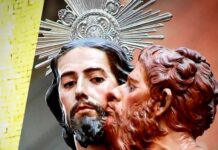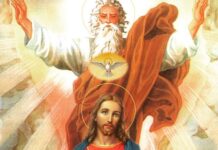As we enter the second session of this study series, we hope you have already begun to read the Book of Revelation. May God shower his blessings on you in abundance as promised: ‘Blessed is the one who reads aloud the words of the prophecy, and blessed are those who hear and who keep what is written in it; for the time is near’ (Rev 1:3). In the previous session our focus was on the outline of the Book of Revelation, the nature of messages and its purpose. First Chapter of the Revelation concludes by giving the reader a hint as to what should be expected in the following chapters.
‘Now write what you have seen, what is, and what is to take place after this’ (Rev 1:19). It means Revelation deals with three distinct things, what John had already seen (past), what was happening before him (present) and what is going to happen (future). Thanks to the misleading teachings of certain theologians, many Christians are under the wrong impression that Revelation was written for a particular time period and for a specific audience. They consider everything in the Revelation as already happened during the early centuries. Nothing is far from the truth. Revelation is a book referring to the past, commenting on the present, and prophesying about the future.
We should start our study from a robust foundation lest we might find many things in this book incomprehensible. Like any other book in the Bible, Revelation also has a four fold application. First, it is directed at the prevailing situation when it was written. It is addressed to the people of God living at that time. Second, it is written for a universal audience, ie. for all the churches of all times. Third, it has a prophetic dimension. It gives a number of prophecies about future things. Fourth and most important is its personal application. Like any other verse from the Bible, the messages of Revelation also are personally addressed to you and me individually. Jesus told the parable of the good samaritan not as a story. He wanted every man and woman who read it to become a good samaritan in their lives. When Jesus said; “Out of the believer’s heart shall flow rivers of living water” (Jn 7:38), he had in his mind every person getting the anointing of the Holy Spirit, after his ascension. Jesus instituted the Holy Eucharist for his disciples as well as for all generations to come. It is very easy to miss this universal character of the Bible, which is one of the greatest dangers of our times. At the birth of Jesus, the angel said to the shepherds: “I am bringing you good news of great joy for all the people”(Lk 2:10). God’s messages are intended to reach each and every person, irrespective of their place of dwelling or time of living. Revelation is no exception.
Chapters 2 and 3 contain the letters written to the seven churches and today we will start with the message to the church in Ephesus. Remember that they are applicable to all churches of all times and contain messages of a prophetic dimension as also a message personal to you and me. At the introduction stage itself, Jesus mentions the universal nature of the messages when he says: ‘These are the words of him who holds the seven stars in his right hand, who walks among the seven golden lampstands’ ( Rev 2:1). We should not try to limit Jesus Christ within a preset definition. He is ‘walking among’ all churches. In the previous session we found that the seven lampstands represent seven churches and seven stars represent the angels of those churches. Here ‘angel of the church’ seems to stand for the person in charge of the church like bishop, priest, pastor or elder.
As a rule Jesus starts with some words of appreciation. In the case of Ephesians, the good things that Jesus wanted to commend are their hard work, patient endurance, intolerance towards evildoers and their discernment in identifying false apostles. We need not be surprised at the appreciation they received for their hard work. It was the legacy of Paul the Apostle who established the church in Ephesus. The way in which Paul edified them is a classic example to preachers, elders and priests to follow. In Acts 19:9 we read that he used to teach his disciples in the lecture hall of a certain person named Tyrannus. Some ancient authorities mention that he used to teach them from eleven o’clock in the morning to four in the afternoon.
Now read Acts 20: 17-35, where Paul addresses the Ephesian elders. He reminds them that he used to teach them publicly and from house to house. He recollects that for three years he did not cease night or day to warn everyone with tears. We know Paul was a tentmaker, working hard to earn a livelihood and finding time in between to preach the gospel . ‘I coveted no one’s silver or gold or clothing. You know for yourselves that I worked with my own hands to support myself and my companions’ (Acts 20:33-34). He was a ‘part time minister’ doing full time service to the Lord. If a tentmaker could develop a zealous church from scratch even while toiling with his hands for his daily needs, what is the message it gives to our full time ministers? What is the message it gives to the laity, who hide behind the excuse that they have a family and they have to work hard to support them leaving them with no time to spare for Lord’s work?
Next commendation is for the patient endurance of Ephesians. It is a virtue we should acquire at any cost, because it is a pre- condition to be saved. This is what Jesus says: “But the one who endures to the end will be saved” (Mt 24:13). The church in Ephesus has this big virtue. Do we have this most essential quality in us? If not we should pray for getting it. Patient endurance means continuing our good works in spite of overwhelming odds and persecutions till the very last moment. Let us remember the words of our Lord: “No one who puts a hand to the plow and looks back is fit for the kingdom of God”(Lk 9:62). Perseverance and endurance is a must to reach heaven.
Next comes the intolerance of the Ephesians towards evildoers. This is one area we should meditate through and through in our times. In these times, a tendency is growing within the Church and also in society at large to tolerate everything evil in the name of liberty and personal freedom. We need not go into details as we are quite familiar with what is happening around us. A good church will never tolerate evildoers. Loving the sinner is not to be equated with tolerating his sinful deeds.
Jesus appreciates the Ephesians in another area too, which is perhaps the most important:
‘You have tested those who claim to be apostles but are not, and have found them to be false’ (Rev 2:2). In simple words, the church in Ephesus had the gift of discernment, that too in abundance. For us, who live among false prophets whose numbers outnumber that of true prophets, the gift of discernment is what we need the most. Jesus has warned us that a time will come when false prophets will appear and try to lead astray even the elect. For the Ephesians, it was the fulfilment of the words of Paul: “I know that after I have gone, savage wolves will come in among you, not sparing the flock. Some even from your own group will come distorting the truth in order to entice the disciples to follow them” (Acts 20:29-30).
Jesus himself says: ‘Beware of false prophets, who come to you in sheep’s clothing but inwardly are ravenous wolves’ (Mt 7:15). Identify them and run away from them so that Jesus will appreciate us also. Do not be afraid of their strength or numbers. We have prophet Elijah who challenged Ahab, as our model. “Now therefore have all Israel assemble for me at Mount Carmel, with the four hundred fifty prophets of Baal and the four hundred prophets of Asherah, who eat at Jezebel’s table” (1 Kings 18:19). A single true prophet is enough to challenge hundreds or even thousands of false prophets, because it is God who helps him.
Peter the Apostle reminds us that false prophets of the kind that destroyed the faith of Israelites will appear in the church also. ‘But false prophets also arose among the people, just as there will be false teachers among you, who will secretly bring in destructive opinions. They will even deny the Master who bought them – bringing swift destruction on themselves. Even so, many will follow their licentious ways, and because of these teachers the way of truth will be maligned’ (2 Pet 2:1-2). Peter wrote these lines for the guidance of our generation as well. Have you not seen false teachers, secretly bringing in destructive opinions? Have you not seen those who deny the divinity of Jesus and the sacrifice he accomplished for our salvation? Have you not noticed their licentious ways, and their attempts to legitimize sin ? Have you not felt the pain of many Christians following their evil ways? Are you not concerned about the disgrace these wolves in sheep’s clothing bring to the Church? Living among false prophets in a time of apostasy is not an easy thing. But we have to hold on.
Ephesians have undergone persecution for the sake of the name of Jesus but they have not grown weary either. Jesus commends them for this trait too. Their patient endurance helped them during those difficult times. They never felt like running out of steam. Whenever we feel that we are running out of steam in our spiritual journey, we have to hold on with patient endurance. There is no other way.
After a long list of appreciations, now it is time for Jesus to warn the church in Ephesus. His complaint is about only one thing, that the Ephesians have abandoned the love they had at first. Jesus tells them to introspect what went wrong with them, how loving they were in the initial days, and how they lost that love in course of time. It is not difficult for us to imagine ourselves in the place of Ephesians as this is our everyday experience. Somewhere down the line, we realize that our ministries are done not for love but for name and fame. Paul reminds us that by speaking in the tongues of mortals and of angels, or having prophetic powers or having the understanding about all mysteries or having all knowledge or such great faith as to remove mountains or even giving away all our possessions and handing over our body to be burned, we gain nothing unless they are done with love.
We started everything with love, but at some point, that love gave way to arrogance in charity, rituals in worship and self- justification in conduct. Jesus the great physician has prescribed a remedy for this lack of love, which is the most dangerous pandemic the world faces: “Remember then from what you have fallen; repent, and do the works you did at first” (Rev. 2:5). If not, what will happen? Jesus says: “If not, I will come to you and remove your lampstand from its place, unless you repent” (Rev. 2:5). We know that seven lampstands were the symbols of seven churches. In the vision, Jesus was seen walking among those seven golden lampstands. If the lampstand is removed from its place, it simply means that the church is separated from Christ!
None among us would want to belong to a church that is to be removed from the presence of our Saviour. We will repent and start afresh the works of love which is nothing but keeping the commandments. ‘They who have my commandments and keep them are those who love me’ (Jn 14:21).
We have already seen that the message of Revelation, like any other part of the Scripture, has a four fold application. They are local, universal, prophetic and personal. In other words, what Jesus told the church in Ephesus is equally applicable to us also. It means that if we work hard, endure patiently, do not tolerate evildoers, hold on until the end, discern good teachers from false prophets and finally regain the initial zeal and love, we will be honored in his presence. ‘To everyone who conquers, I will give permission to eat from the tree of life that is in the paradise of God'( Rev. 2:7).
We read about this ‘tree of life’ first in the Book of Genesis. ‘Out of the ground the Lord God made to grow every tree that is pleasant to the sight and good for food, the tree of life also in the midst of the garden, and the tree of the knowledge of good and evil’ (Gen. 2:9). The right to eat from this tree of life was forfeited by the first sin. God, in His infinite wisdom, knew that eating from the tree of life in a state of sin will bring them eternal damnation. It was God’s mercy that prompted Him to send them forth from the garden of Eden. ‘Then the Lord God said, “See, the man has become like one of us, knowing good and evil; and now, he might reach out his hand and take also from the tree of life, and eat, and live forever” (Gen 3:22). Human history, as we know it today, starts from this expulsion from paradise. It is quite logical that the consummation of history coincides with the re-entry of the humankind to the very place from where they were once expelled. Final chapters of the Book of Revelation describe Heavenly Jerusalem where the tree of life stands. ‘On either side of the river is the tree of life with its twelve kinds of fruit…..’ ( Rev. 22:2).
Once we are there in Heavenly Jerusalem, we can eat from the tree of life as well, but the condition of re-entry remains unchanged. It is to come out of sin, and be in a state of grace at all times. ‘ But nothing unclean will enter it, nor anyone who practices abomination or falsehood, but only those who are written in the Lamb’s book of life’ (Rev. 21:27).
Let anyone who has an ear to listen to what the Spirit is saying to the churches ( Rev 2:7)










